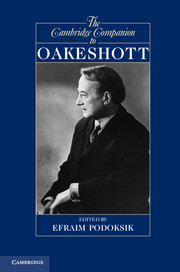Book contents
- Frontmatter
- Introduction
- Part I Oakeshott's philosophy
- Part II Oakeshott on morality, society and politics
- Part III Oakeshott and others
- 11 Oakeshott in the context of British Idealism
- 12 Oakeshott in the context of German Idealism
- 13 Oakeshott's contribution to Hobbes scholarship
- 14 Oakeshott and the Cold War critique of political rationalism
- Bibliography
- Index
11 - Oakeshott in the context of British Idealism
from Part III - Oakeshott and others
Published online by Cambridge University Press: 28 September 2012
- Frontmatter
- Introduction
- Part I Oakeshott's philosophy
- Part II Oakeshott on morality, society and politics
- Part III Oakeshott and others
- 11 Oakeshott in the context of British Idealism
- 12 Oakeshott in the context of German Idealism
- 13 Oakeshott's contribution to Hobbes scholarship
- 14 Oakeshott and the Cold War critique of political rationalism
- Bibliography
- Index
Summary
INTRODUCTION
In a review of W. M. Urban's book Beyond Realism and Idealism Michael Oakeshott captured the essence of the difference between the two competing theories of knowledge: ‘the “driving force” of Idealism is the belief that the known cannot be independent of the knower; and the “resistance” of Realism is the belief that what is known must be an antecedent reality’. In the modern era Berkeley developed a form of Idealism that was designed to counter materialism and reveal the ultimate spiritual character of experience beneath our sense impressions. Berkeley contended that there can be nothing but spirits which are active on the one hand and passive sensible objects on the other, and objects do not exist except as perceived by the active spirit. Despite being a sceptic, Berkeley was convinced of the reality of the self in self-conscious activity.
It was this ‘subjective’ Idealism to which G. W. F. Hegel objected when he claimed that the universe is an undifferentiated indivisible unity in which there is no conception of the self until thought begins to differentiate the I from the Thou. Absolute Idealism begins with the principle of unity, and attempts to account for the differentiations into which this unity has fragmented. This is a reaction, not only against Berkeley but also against the dualism of Descartes’ belief that the mind must conform to its objects, and against Kant’s contention that reality must conform to the a priori categories of the mind while retaining a dualism between things as they are known to the mind and as they are in themselves. The fundamental principle of Absolute Idealism affirms that all that exists and appears is in and for consciousness. There can be nothing beyond or outside consciousness.
- Type
- Chapter
- Information
- The Cambridge Companion to Oakeshott , pp. 245 - 273Publisher: Cambridge University PressPrint publication year: 2012
- 1
- Cited by



